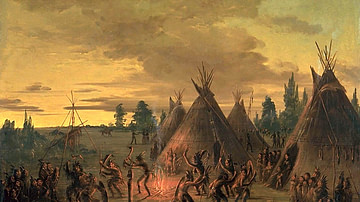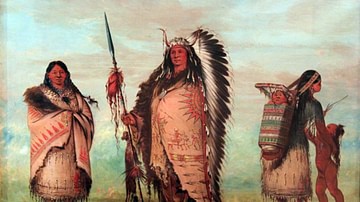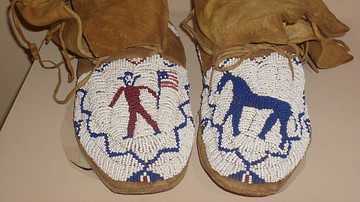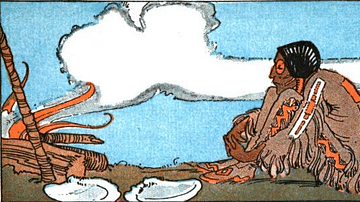The Sioux stories known as Iktomi tales concern the trickster figure Iktomi (also known as Unktomi) who appears, variously, as a hero, sage, villain, clown, inept buffoon – or in other roles – but always serves to illustrate some important lesson or provide instruction in cultural values.
In White Plume, he is the villain who tries to steal the hero's identity, and in The Bound Children he is the sage mediating a dispute, but in Iktomi and the Muskrat and Iktomi's Blanket, given below, he is the buffoon who highlights the Sioux values of gratitude, keeping one's promises, and the importance of hospitality.
Other Iktomi tales, such as Iktomi and the Coyote and Unktomi and the Arrowheads present the character in other roles – as a fool who cannot tell the difference between life and death and as a helper and punisher of transgressors, respectively – but these tales, like the many others featuring Iktomi, all serve the same purpose of entertaining an audience while imparting some important life lesson.
Text
The two tales below come from American Indian Stories and Old Indian Legends by the Yankton Dakota Sioux activist and writer Zitkála-Šá (l. 1876-1938).
In Iktomi and the Muskrat, the value of hospitality is highlighted and, for the original audience, would have had special significance as the muskrat is sometimes featured in place of the otter in the Lakota Sioux Creation Story as the first of the animals to dive into the primordial waters to try to bring mud up to the surface to form dry land. The muskrat was therefore associated with creation and the Great Spirit and, because of this, symbolizes wealth, both spiritual greatness and material gain.
When Iktomi refuses hospitality to the muskrat, therefore, he is not just denying a fellow creature a place at his table, but is cheating himself out of whatever gifts he might have received in behaving properly. Further, since the muskrat is so closely associated with the Creator God, Iktomi is essentially insulting his maker to his face.
Iktomi's Blanket focuses on the value of gratitude and keeping one's promises. Inyan, the great-grandfather and gift giver, is one of the four primordial gods along with Han, Maka, and Skan, all aspects of Wakan Tanka – The Great Mystery – and so revered as sacred entities. Inyan is associated with stability, certainty, and dependability, and is symbolized by rock. When Iktomi asks for the gift of food, it is given; but Inyan is just as able to take as to give when the situation warrants, and, in this case, when Iktomi withdraws his gift of gratitude, Inyan responds in kind by taking back the food. Iktomi's effrontery in stealing back what was freely given would also have had a deeper meaning for an original audience in that Iktomi is not just taking unjustly from another but from a god.

Iktomi and the Muskrat
Beside a white lake, beneath a large grown willow tree, sat Iktomi on the bare ground. The heap of smoldering ashes told of a recent open fire. With ankles crossed together around a pot of soup, Iktomi bent over some delicious, boiled fish. Quickly he dipped his black horn spoon into the soup, for he was ravenous. Iktomi had no regular mealtimes. Often, when he was hungry, he went without food. Well-hidden between the lake and the wild rice that grew on its banks, he looked nowhere save into the pot of fish. Not knowing when the next meal would be, he meant to eat enough now to last some time.
"How now, my friend!" said a voice out of the wild rice. Iktomi jumped. He almost choked on his soup. He peered through the long reeds from where he sat with his long horn spoon in mid-air.
"Hello, my friend!" said the voice again, this time close at his side. Iktomi turned and there stood a dripping muskrat who had just come out of the lake.
"Oh, it is my friend who startled me. I wondered if among the wild rice some spirit voice was talking. Hello, my friend!" said Iktomi. The muskrat stood smiling. On his lips hung a ready "Yes, my friend," when Iktomi would ask, "My friend, will you sit down beside me and share my food?"
That was the custom of the plains people. Yet Iktomi sat silent. He hummed an old dance-song and beat gently on the edge of the pot with his buffalo-horn spoon. The muskrat began to feel awkward before such lack of hospitality and wished he had stayed underwater.
After many heart throbs Iktomi stopped drumming with his horn ladle, and looking upward into the muskrat's face he said, "My friend, let us run a race to see who shall win this pot of fish. If I win, I shall not need to share it with you. If you win, you shall have half of it." Springing to his feet, Iktomi began at once to tighten the belt about his waist.
"My friend Ikto, I cannot run a race with you! I am not a swift runner, and you are nimble as a deer. We shall not run any race together," answered the hungry muskrat.
For a moment Iktomi stood with a hand on his long protruding chin. His eyes were fixed on something in the air. The muskrat looked out of the corners of his eyes without moving his head. He watched the wily Iktomi concocting a plot.
"Yes, yes," said Iktomi, suddenly turning his gaze on the unwelcome visitor, "I shall carry a large stone on my back. That will slacken my usual speed, and the race will be a fair one." Saying this he laid a firm hand upon the muskrat's shoulder and started off along the edge of the lake.
When they reached the opposite side, Iktomi poked about in search of a heavy stone. He found one half-buried in the shallow water. Pulling it out on dry land, he wrapped it in his blanket.
"Now, my friend, you shall run on the left side of the lake, I on the other. The race is for the boiled fish in yonder kettle!" said Iktomi.
The muskrat helped to lift the heavy stone upon Iktomi's back. Then they parted. Each took a narrow path through the tall reeds fringing the shore. Iktomi found his load a heavy one. Perspiration hung like beads on his brow. His chest heaved hard and fast. He looked across the lake to see how far the muskrat had gone, but nowhere did he see any sign of him.
"Well, he is running low under the wild rice!" said he to himself. Yet as he scanned the tall grasses on the lake shore, he saw not one stir as if to make way for the runner. "Ah, has he gone so fast ahead that the disturbed grasses in his trail have quieted again?" exclaimed Iktomi. With that thought he quickly dropped the heavy stone. "No more of this!" he said, patting his chest with both hands.
Off with a springing bound, he ran swiftly toward the goal. Tufts of reeds and grass fell flat under his feet. Hardly had they raised their heads when Iktomi was many paces gone. Soon he reached the heap of cold ashes. Iktomi halted stiff as if he had struck an invisible cliff. His black eyes showed a ring of white about them as he stared at the empty ground. There was no pot of boiled fish! There was no muskrat in sight!
"Oh, if only I had shared my food like a real Dakota, I would not have lost it all! Why did I not know the muskrat would run through the water? He swims faster than I could ever run! That is what he has done. He has laughed at me for carrying a weight on my back while he shot hither like an arrow!" Crying thus to himself, Iktomi stepped to the water's brink. He stooped forward with a hand on each bent knee and peeped far into the deep water.
"There!" he exclaimed, "I see you, my friend, sitting with your ankles wrapped around my little pot of fish! My friend, I am hungry. Give me a bone!"
"Ha! Ha! Ha!" laughed the water-man, the muskrat. The sound did not rise up out of the lake, for it came down from overhead. With his hands still on his knees, Iktomi turned his face upward into the great willow tree. Opening wide his mouth he begged, "My friend, my friend, give me a bone to gnaw!"
"Ha! Ha!" laughed the muskrat, and leaning over the limb he sat upon, he let fall a small sharp bone that dropped right into Iktomi's throat. Iktomi almost choked before he could get it out. In the tree the muskrat sat laughing loud. "Next time, say to a visiting friend, ‘Be seated beside me, my friend. Please share my food.' Then perhaps you won't lose it all."
Iktomi's Blanket
Alone within his tepee sat Iktomi. The sun was but a hand's breadth from the western edge of land.
"Those, bad, bad gray wolves! They ate up all my nice fat ducks!" muttered he, rocking his body to and fro. He was cuddling the evil memory he bore those hungry wolves. At last, he ceased to sway his body backward and forward, but sat still and stiff as a stone image. "I'll go to Inyan, the great-grandfather, and pray for food!" he exclaimed.
At once he hurried forth from his tepee and, with his blanket over one shoulder, drew nigh to a huge rock on a hillside. With half-crouching, half-running strides, he fell upon Inyan with outspread hands.
"Grandfather! Pity me. I am hungry. I am starving. Give me food. Great-grand-father, give me meat to eat!" he cried. All the while he stroked and caressed the face of the great stone god.
The all-powerful Great Spirit, who makes the trees and grass, can hear the voice of those who pray in many varied ways. The hearing of Inyan, the large hard stone, was the one most sought after. He was the great-grandfather, for he had sat upon the hillside many, many seasons. He had seen the prairie put on a snow-white blanket and then change it for a bright green robe more than a thousand times. Still unaffected by the myriad moons he rested on the everlasting hill, listening to the prayers of Indian warriors. Before the finding of the magic arrow he had sat there.
Now, as Iktomi prayed and wept before the great-grandfather, the sky in the west was red like a glowing face. The sunset poured a soft mellow light on the huge gray stone and the solitary figure beside it. It was the smile of the Great Spirit upon the grandfather and the wayward child.
The prayer was heard. Iktomi knew it. "Now, Grandfather, accept my offering—it is all I have," said Iktomi as he spread his half-worn blanket upon Inyan's cold shoulders. Then Iktomi, happy with the smile of the sunset sky, followed a foot-path leading toward a thicketed ravine. He had not gone many paces into the shrubbery when before him lay a freshly killed deer!
"This is the answer from the red western sky!" cried Iktomi, with hands uplifted. Slipping a long thin blade from his belt, he cut large chunks of choice meat. Sharpening some willow sticks, he planted them around a woodpile he had ready to kindle. On these stakes he meant to roast the venison.
While he was briskly rubbing two long sticks to start a fire, the sun in the west fell out of the sky below the edge of land. Twilight was over all. Iktomi felt the cold night air on his bare neck and shoulders. "Ough!" he shivered as he wiped his knife on the grass. Tucking it in a beaded case hanging from his belt, Iktomi stood erect, looking about.
He shivered again. "Ough! Ah! I am cold. I wish I had my blanket!" whispered he, hovering over the pile of dry sticks and the sharp stakes round about it. Suddenly he paused and dropped his hands at his sides.
"The old great-grandfather does not feel the cold as I do. He does not need my old blanket as I do. I wish I had not given it to him. Oh! I think I'll run up there and take it back!" said he, pointing his long chin toward the large gray stone.
Iktomi had no need of his blanket in the warm sunshine, and it had been very easy to part with a thing that he could not miss. But the chilly night wind quite froze his ardent thank offering. Thus, running up the hillside, his teeth chattering all the way, he drew near to Inyan, the sacred symbol. Seizing one corner of the half-worn blanket, Iktomi pulled it off with a jerk.
"Give my blanket back, old Grandfather! You do not need it. I do!" This was very wrong, yet Iktomi did it, for his wit was not wisdom.
Drawing the blanket tight over his shoulders, he descended the hill with hurrying feet. He was soon upon the edge of the ravine. A young moon, like a bright bent bow, climbed up from the southwest horizon a little way into the sky. In this pale light Iktomi stood motionless as a ghost amid the thicket. His woodpile was not yet kindled. His pointed stakes were still bare as he had left them. But where was the deer—the venison he had felt warm in his hands a moment ago? It was gone. Only the dry rib bones lay on the ground like giant fingers. Iktomi was troubled.
At length, stooping over the white dried bones, he took hold of one and shook it. The bones rattled together at his touch. Iktomi let go his hold. He sprang back amazed. And though he wore a blanket his teeth chattered more than ever. Then, instead of being grieved that he had taken back his blanket, he cried aloud, "Hin-hin-hin! If only I had eaten the venison before going for my blanket!"
Those tears no longer moved the hand of the Generous Giver. They were selfish tears. The Great Spirit does not heed them ever.











